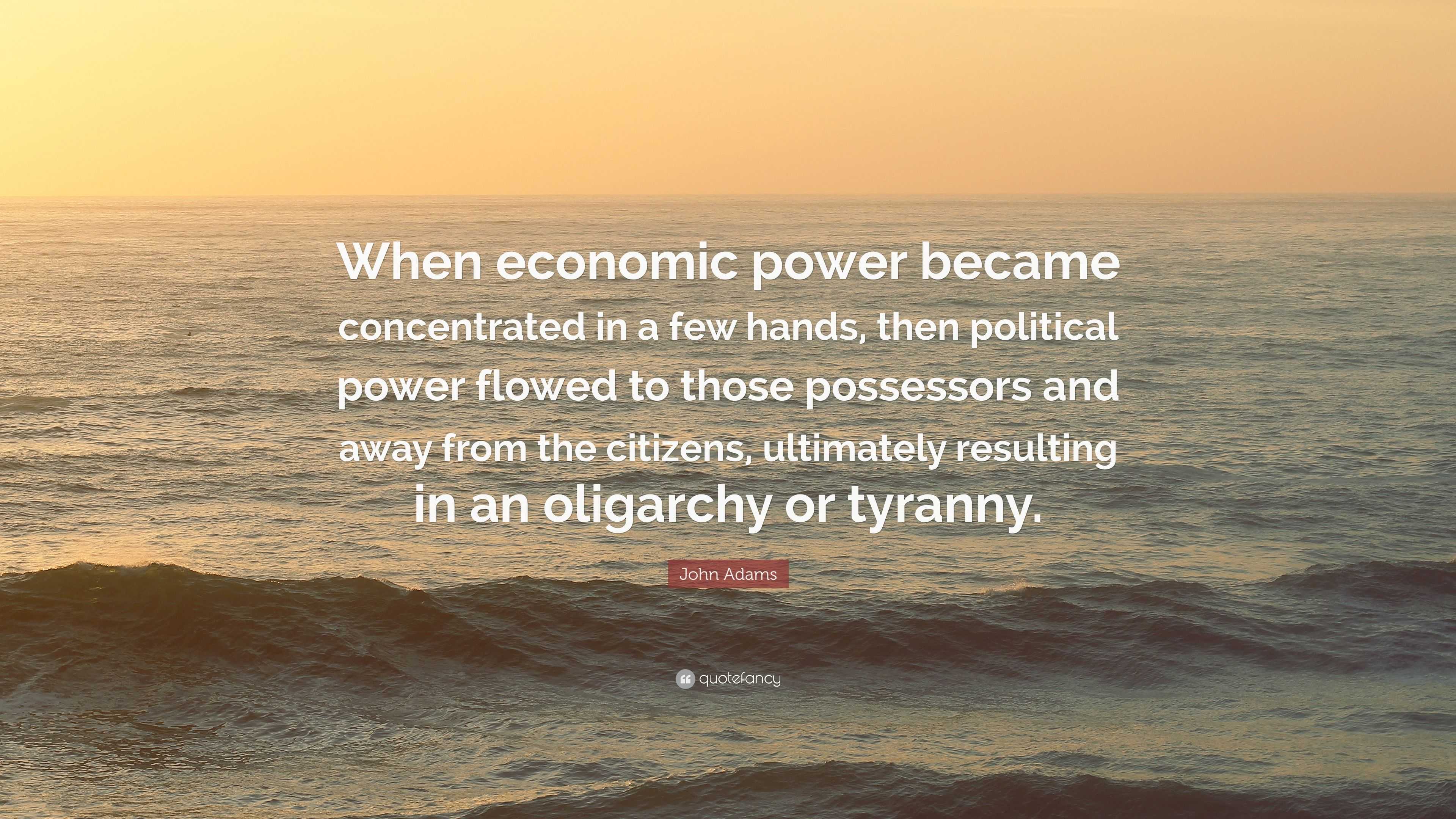For centuries, “Oligarchy: The Concentration of Power In The Hands Of The Few” has been a compelling concept that has intrigued scholars, historians, and political scientists alike. Oligarchy, a form of government where power is held by a small elite group, has manifested itself in societies worldwide throughout past and present. Understanding its dynamics is crucial for comprehending the complexities of power structures and their impact.
Editor's Notes: This topic is of paramount importance given the prevalence of oligarchic tendencies in contemporary societies. To empower our readers with insights into this phenomenon, we have conducted thorough research and analysis, compiling this comprehensive guide to shed light on the nature, causes, and consequences of oligarchy.
In this guide, we delve into the nuances of oligarchy, exploring its historical roots, forms, and impacts. We examine the factors that contribute to its emergence, the strategies employed by oligarchies to maintain their power, and their potential implications for society.
Oligarchy: The Concentration Of Power In The Hands Of The Few
FAQ
This FAQ section provides essential information on oligarchy, addressing common questions and misconceptions surrounding this complex topic. Explore the answers to delve deeper into the nature and implications of concentrated power in the hands of a select few.

A. Concentration of power in few hands.B. Democracy is like a horse - Source brainly.in
Question 1: What is an oligarchy and how does it differ from other forms of government?
An oligarchy is a form of government in which power is vested in a small group of individuals, typically from the elite or wealthy segments of society. Unlike democracies, where power is distributed among the general populace, oligarchies grant disproportionate influence and control to a select few. This concentration of authority distinguishes oligarchies from other governance structures.
Question 2: What are the characteristics of an oligarchy?
Oligarchies often exhibit several defining characteristics. Power is typically concentrated in the hands of a small number of individuals, who may form a ruling council or hold key positions within political, economic, or military institutions. Oligarchies may also suppress political participation and dissent by restricting voting rights, controlling the media, and using force to maintain their power.
Question 3: How does an oligarchy form and who typically gains power?
Oligarchies can emerge through various means, such as the gradual accumulation of wealth and influence by a small group or a sudden power grab by a dominant faction. Those who gain power in an oligarchy often come from elite families, wealthy individuals, or powerful military or corporate leaders. They may use their resources and connections to establish and maintain control over political and economic institutions.
Question 4: What are the advantages of oligarchy?
Proponents of oligarchy argue that it can provide stability, efficiency, and expertise in decision-making. By concentrating power in the hands of a few, oligarchies can avoid the potential chaos and delays associated with broader political participation. They may also claim to possess greater knowledge and experience, enabling them to make sound decisions for the benefit of society.
Question 5: What are the disadvantages of oligarchy?
Opponents of oligarchy contend that it leads to inequality, corruption, and a lack of accountability. Oligarchies can perpetuate social and economic disparities by favoring the interests of the ruling elite at the expense of the broader population. Additionally, the concentration of power in a few hands can foster corruption and the abuse of authority, as there are fewer checks and balances to prevent wrongdoing.
Question 6: Are there any examples of oligarchies in history or present-day?
Throughout history, numerous nations and societies have exhibited oligarchic tendencies. Ancient Greece, Rome, and Venice are notable examples. In modern times, some argue that certain countries or governments may have oligarchic characteristics, where a small group of individuals or families wield significant political and economic influence.
In conclusion, oligarchies represent a complex and controversial form of government where power is concentrated in the hands of a select few. While proponents argue for its stability and efficiency, critics highlight the potential for inequality, corruption, and a lack of accountability. Whether an oligarchy is beneficial or detrimental to society remains a subject of ongoing debate and analysis.
To learn more about the multifaceted nature of oligarchies, explore our comprehensive article on Oligarchy: The Concentration Of Power In The Hands Of The Few.
Tips
The concentration of power in the hands of the few - known as an oligarchy - can have significant consequences for society. To mitigate these effects, consider implementing the following tips:
Tip 1: Promote Transparency and Accountability
Increase transparency in decision-making processes to ensure that power-holders are held accountable for their actions. Implement mechanisms for public scrutiny, regular reporting, and independent auditing.
Tip 2: Foster Civic Engagement and Empowerment
Encourage active participation of citizens in decision-making and governance. Support civic organizations, facilitate public consultations, and provide opportunities for community involvement.
Tip 3: Strengthen the Rule of Law and Independent Judiciary
Uphold the rule of law and ensure an impartial judiciary. Establish mechanisms for checks and balances to prevent abuse of power and safeguard individual rights.
Tip 4: Promote Education and Critical Thinking
Educate citizens about the dangers of oligarchy and the importance of democratic principles. Foster critical thinking skills to equip individuals with the ability to question and challenge concentrated power.
Tip 5: Encourage Media Independence and Freedom of Expression
Support independent and diverse media outlets to provide critical reporting and investigative journalism. Protect freedom of expression and ensure that dissenting voices are not silenced.
Tip 6: Build Coalitions and Collaborations
Foster collaborations between civil society organizations, activists, and governments. Join forces to advocate for policies that promote transparency, accountability, and citizen empowerment.
Tip 7: Support Alternative Structures of Power
Encourage the development of alternative power structures, such as decentralized networks, cooperatives, and non-profit organizations. Create spaces for marginalized voices to be heard and challenge concentrated power.
Tip 8: Monitor and Evaluate Progress
Regularly monitor and evaluate the effectiveness of measures taken to mitigate the effects of oligarchy. Collect data, track progress, and adjust strategies as necessary to ensure ongoing accountability and effectiveness.
These tips provide a roadmap for addressing the challenges posed by oligarchy. By implementing these measures, we can work towards a more equitable and democratic society.
Oligarchy: The Concentration Of Power In The Hands Of The Few
Oligarchy, a political system marked by the concentration of power in the hands of a select few, comprises various key aspects that unveil its intrinsic nature and impact on society.
- Limited Rule: Government by a small elite group.
- Economic Control: Oligarchs often hold significant economic power, influencing policy decisions.
- Inherited Wealth: Power and influence may be passed down through generations, perpetuating the oligarchy.
- Erosion of Democracy: Oligarchies undermine democratic principles by limiting political participation and accountability.
- Social Inequality: Oligarchies perpetuate social stratification, favoring the elite at the expense of the masses.
- Global Implications: Oligarchies can transcend national boundaries, influencing international affairs through economic and political clout.
These aspects highlight the systemic nature of oligarchy, emphasizing the concentration of power, economic influence, and its detrimental effects on democracy, social equality, and global dynamics. Understanding these key aspects is crucial for comprehending the nature of oligarchy and its impact on societies worldwide.

Oligarchy - Source education.nationalgeographic.org
Oligarchy: The Concentration Of Power In The Hands Of The Few
Oligarchy, the concentration of power in the hands of a few, is a recurring phenomenon throughout history. It arises due to various factors, including economic inequality, political manipulation, and the erosion of democratic institutions. Oligarchies can have significant negative consequences for society, leading to wealth disparities, political corruption, and the suppression of dissent.

John Adams Quote: “When economic power became concentrated in a few - Source quotefancy.com
Oligarchies often emerge when a wealthy elite controls a disproportionate share of resources and uses this power to influence government policies and institutions. This can lead to a situation where the laws and regulations favor the interests of the oligarchs, perpetuating their wealth and power. Political manipulation, such as gerrymandering and voter suppression, can further entrench oligarchies by limiting the ability of ordinary citizens to participate in the political process.
The erosion of democratic institutions, such as an independent judiciary and free press, can also contribute to the rise of oligarchy. Without strong institutions to hold the powerful accountable, oligarchs can operate with impunity, undermining the rule of law and democratic principles.
Oligarchies can stifle innovation and economic growth by limiting opportunities for those outside the elite circle. They can also lead to social unrest and political instability as marginalized groups become frustrated with the lack of upward mobility and political representation.
Conclusion
Oligarchy is a complex and pernicious form of political and economic power that undermines democracy and perpetuates inequality. Understanding the causes and consequences of oligarchy is essential for developing strategies to combat it and ensure a more just and equitable society.
Overcoming oligarchy requires a multifaceted approach that includes strengthening democratic institutions, promoting economic equality, and fostering a culture of political participation and civic engagement. By empowering ordinary citizens and limiting the influence of the wealthy elite, we can create a more inclusive and democratic society.